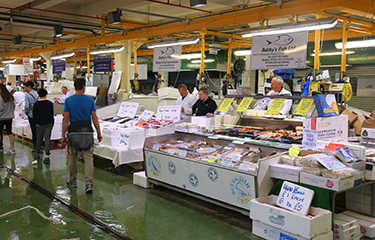Grocery inflation has hit another record high in the United Kingdom, reaching 14.7 percent in October, according to research firm Kantar. In response, consumers are pulling back on seafood purchasing because of higher prices, while retailers are implementing strategies to get shoppers back to the department and focused on seafood for the upcoming holiday season.
Four-week grocery price inflation has hit another record high since Kantar began tracking prices in this way in 2008, and take-home grocery sales rose by 5.2 percent for the 12 weeks ending 30 October.
“Yet again, we have a new record high figure for grocery price inflation and it's too early right now to call the top,” Kantar Head of Retail and Consumer Insight Fraser McKevitt said in a press release.
Consumers face a GBP 682 (USD 787, EUR 782) increase in their annual grocery bill if they continue to buy the same items, according to McKevitt. Plus, 27 percent of Britons now say they’re struggling financially – double the proportion Kantar recorded last November.
“Nine in ten of this group say higher food and drink prices are a major concern, second only to energy bills, so it’s clear just how much grocery inflation is hitting people’s wallets and adding to their domestic worries,” McKevitt said.
Inflation has been negatively impacting chilled seafood sales for the past few months. Fish prices jumped 15 percent in September, according to the U.K. Consumer Price Index. As a result, for the 12 weeks to 2 October, chilled fish sales dropped 4.8 percent by value and 9.2 percent by volume, according to Kantar.
Out of all proteins, chilled fish starts at the highest price point per kilo at GBP 12.58 (USD 14.52, EUR 14.42), “meaning there is a lower ceiling in price expansion before it starts to impact shopper numbers,” Kantar Consumer Insight Director Stewart Wise said in the firm’s most recent Meat Fish and Poultry Market Update.
However, several grocery chains are slashing prices – including on some seafood items.
In September, Poundland expanded its chilled and frozen food departments to more than 350 stores. It launched a value line including seafood items this summer.
“Poundland has seen strong growth in frozen food sales this year as customers realize the power of frozen food in cutting back on food waste and managing tight budgets that need to stretch to pay increasing energy and fuel costs,” Poundland said in a press release.
The retailer’s recently launched line of 11 “Cook-it” value meat and seafood items include single cod and salmon fillets for GBP 3.00 (USD 3.46, EUR 3.44) each.
Meanwhile, Marks and Spencer said it would lock prices on more than 100 “customer favorites” until the end of January 2023. Additionally, the retailer launched a "Steak Night Dine In" for two, “offering customers restaurant quality food at a fraction of the price,” M&S said in a press release.
Family Matters Index data shows 62 percent of U.K. adults have scaled back spending on eating out in the last six months, with 82 percent of those cooking meals from home instead, M&S said.
Morrisons said in late September it is reducing prices on 150 of its most popular products – including fish fingers – to help make shoppers’ money go further.
The lower prices cover nearly 6 percent of Morrisons total volume sales and offer customers an average saving of 14 percent, the retailer said in a press release.
Shoppers are switching to own label products to stretch grocery dollars. Own-label sales jumped by 10.3 percent in October, according to Kantar.
"Food and drink spending is generally non-discretionary, so it’s not easy for shoppers to cut back the amount they buy. Many are looking to reduce costs in other ways and the big shift to own label is still accelerating,” McKevitt said.
While seafood sales typically pick up during the holiday season, fewer people are stocking the cupboards for Christmas in October, according to Kantar.
“This time last year, two million consumers had already bought their festive Christmas pudding. We’ve seen 32 percent fewer shoppers doing that this time around, suggesting people are not trying to spread the cost of their purchasing – at least not in October,” McKevitt said.
An Accenture poll found 70 percent of citizens plan to cut back on overall holiday spending this year, per Bloomberg. 35 percent of Britons are cutting back on food and drink purchases for home consumption, while 46 percent say they plan on reducing how much they go to restaurants.
As in previous months, cost-conscious shoppers frequented discount grocery chains more than in the past. Aldi was the fastest growing retailer in October, boosting sales by 22.7 percent, while Lidl hiked sales by 21.5 percent.
“With economic forecasters warning of a potential recession, it’s worth reflecting on how much the grocery landscape has changed since the 2008 financial crash,” McKevitt noted. “We’ve seen a rise in the market share of the discounters Aldi and Lidl, which together now stands at 16.4 percent, versus 4.4 percent 14 years ago.”
Photo courtesy of Tupungato/Shutterstock







